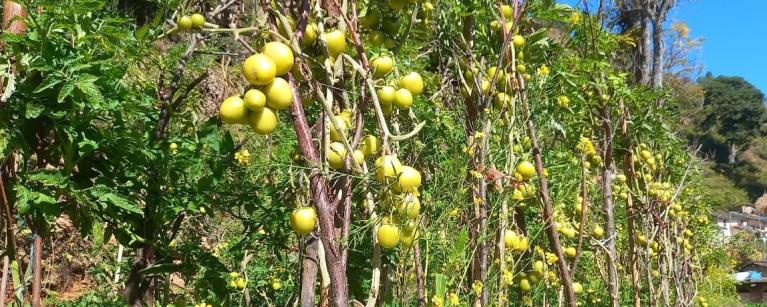Bimala Bad, a Dalit (commonly known as the ‘untouchables’) woman from the Dalit village in Babet, Dashrathchand Municipality, Baitadi, Sudurpaschim Province used to earn a living as a porter not too long ago. Bimala shares that her life has changed for the better since receiving financial and technical support for vegetable farming from Oxfam in Nepal and Rural Development and Environment Management Society (RUDES), a non-governmental organization based in Baitadi. There has been no looking back for her since she started cultivating vegetables in her 2 ropani land.
“After earning a good profit from selling vegetables, my husband stopped going to India searching for work. He now supports me in vegetable farming. I would like to thank Oxfam in Nepal and RUDES for transforming my life,” gushes Bimala.
Bimala now has two poly houses for tomato farming and cultivates cabbage, mustard, spinach, coriander, fenugreek, garden cress and radish in the remaining land. The income from this is enough to meet her household expenses and pay for her children’s school fees.
Bimala is also planning to start fish farming near the river side.
The Gender Responsive Economic Empowerment in Nepal (GREEN) Project implemented by RUDES with the support of Oxfam in Nepal has been promoting vegetable farming in the municipality.
At least 15 women from the village have started commercial vegetable farming since its implementation. They received support for poly houses, varieties of vegetable seeds and building improved cow shed. RUDES has also formed Nagarjun Women Empowerment Centre in the village which motivates people to adopt vegetable farming.
“Babet village’s women have started earning from vegetable farming way beyond their expectations,” mentions Nirmala Devi Bad, leader woman farmer.
Due to the family’s poor economic condition, Nirmala Devi’s husband Keshav Bad had to migrate to India for work. However, he returned to his village after his wife started vegetable farming. Now their financial situation has improved. He is happy that vegetable farming has provided him with the opportunity to live together with his family.
After seeing the success of the women, one of the farmers Ganga Bad of the same village, stopped cultivating maize and wheat and took up tomato farming in a poly house. He now produces more than 200 kgs tomatoes every season.
Likewise, Lait Bad shares, “After receiving the training on the use of poly house and improved and local seeds, I am earning a lot. Oxfam in Nepal and RUDES not only supported me in vegetable farming but also helped set up 10 beehives. We have learned to prepare organic pesticides. Now the village is known as an organic vegetables farming village. The demand for vegetables is high and recently we sold tomatoes at Rs.50 per kg.
